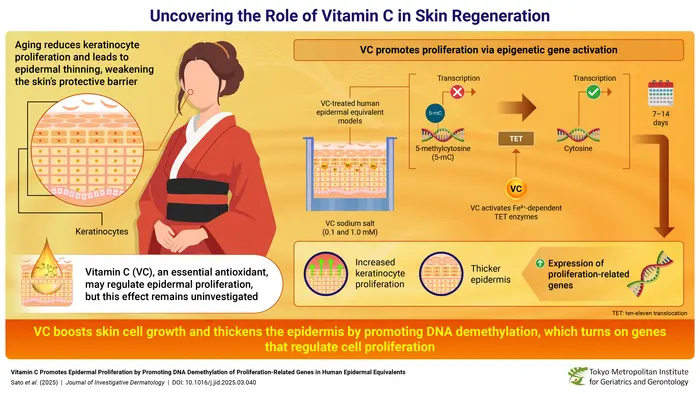Long known for its antioxidant and collagen-boosting properties, Vitamin C may also promote epidermal thickening by activating genes linked to skin cell growth through targeted DNA demethylation mechanisms, finds research published in the Journal of Investigative Dermatology.
“Vitamin C seems to influence the structure and function of epidermis, especially by controlling the growth of epidermal cells. In this study, we investigated whether it promotes cell proliferation and differentiation via epigenetic changes,” explains Study Author Dr. Akihito Ishigami, Vice President of the Division of Biology and Medical Sciences at Tokyo Metropolitan Institute for Geriatrics and Gerontology (TMIG) in Japan.“ We found that Vitamin C helps thicken the skin by encouraging keratinocyte proliferation through DNA demethylation, making it a promising treatment for thinning skin, especially in older adults.”
Showed Thicker Epidermal Cell Layer
To investigate how Vitamin C affects skin regeneration, the team used human epidermal equivalents. In this model, skin cells are exposed to air on the surface while being nourished from underneath by a liquid nutrient medium. The researchers used this model and applied Vitamin C at 1.0 and 0.1mM—concentrations comparable to those typically transported from the bloodstream into the epidermis. On assessing its effect, they found that Vitamin C-treated skin showed a thicker epidermal cell layer without significantly affecting the stratum corneum on day seven. By day 14, the inner layer was even thicker, and the outer layer was found to be thinner, suggesting that Vitamin C promotes the formation and division of keratinocytes. Samples treated with Vitamin C showed increased cell proliferation, demonstrated by a higher number of Ki-67-positive cells.
Importantly, the study revealed that Vitamin C helps skin cells grow by reactivating genes associated with cell proliferation. It does so by promoting the removal of methyl groups from DNA via DNA demethylation.
Sustaining Function of TET Enzymes
The study suggests that Vitamin C supports active DNA demethylation by sustaining the function of TET enzymes (10-11 translocation enzymes), which regulate gene activity. These enzymes convert 5-methylcytosine (5-mC) into 5-hydroxymethylcytosine (5-hmC), a process in which Fe2+ is oxidized to Fe3+. VC helps maintain TET enzyme activity by donating electrons to regenerate Fe2+ from Fe3+, enabling continued DNA demethylation.
The researchers further identified over 10,138 hypomethylated differentially methylated regions in VC-treated skin and observed a 1.6- to 75.2-fold increase in the expression of 12 key proliferation-related genes. When a TET enzyme inhibitor was applied, these effects were reversed, confirming that VC functions through TET-mediated DNA demethylation.
PHOTO CAPTION: Vitamin C is known for its antioxidant properties in the skin and has been previously shown to boost collagen synthesis. Now, the same team of researchers has taken this a step further, using advanced genetic analysis techniques to explore its deeper role. Their findings reveal that Vitamin C promotes epidermal regeneration by activating enzymes that help in activating genes and driving DNA demethylation—a process that reactivates genes involved in cell proliferation, ultimately enhancing keratinocyte growth and leading to thicker, healthier skin.
PHOTO CREDIT: Dr. Akihito Ishigami from Tokyo Metropolitan Institute for Geriatrics and Gerontology (TMIG), Japan


